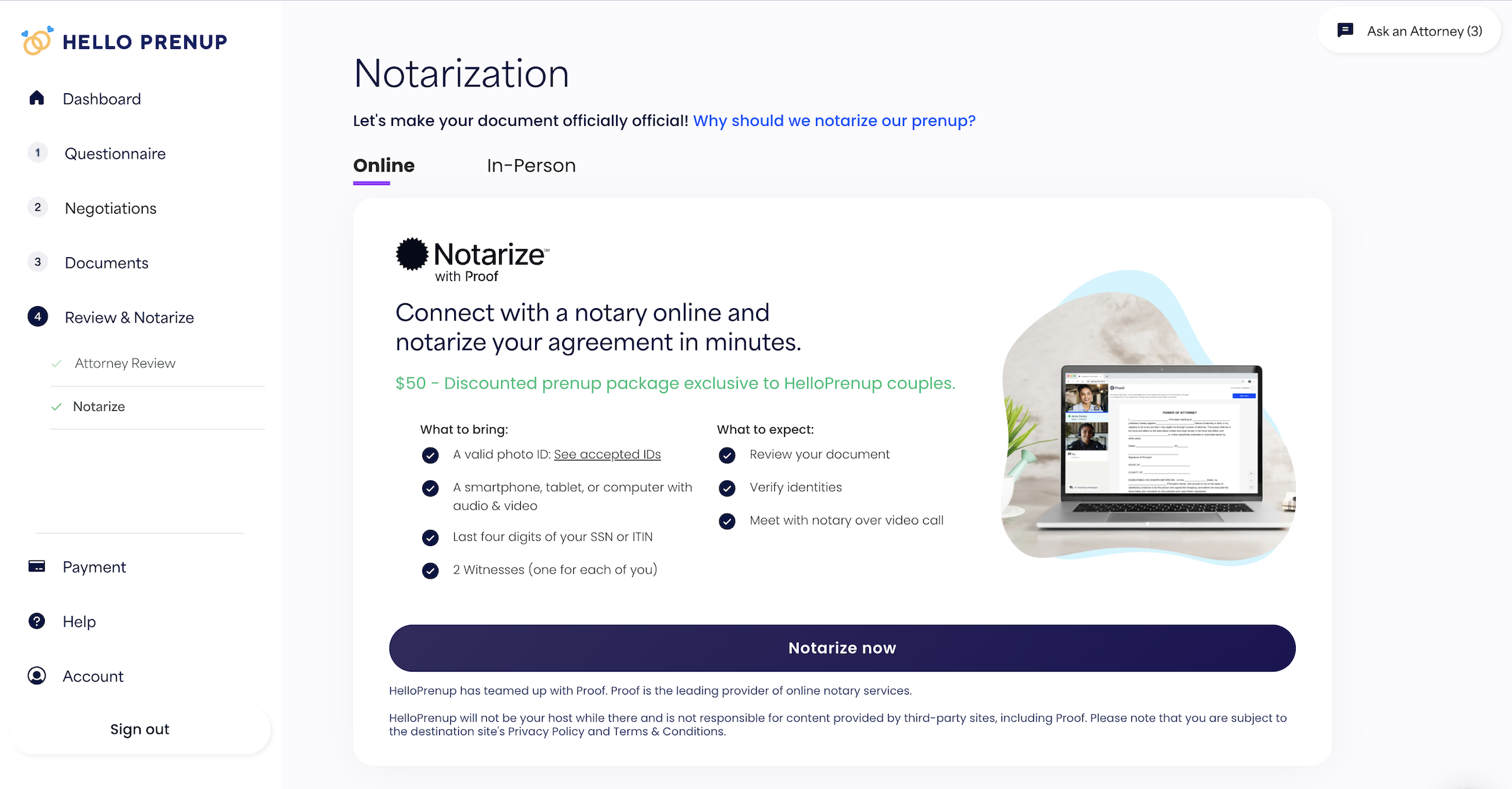New Jersey Prenup Info & Divorce Statutes
Prenuptial Agreements in New Jersey
What to include in a valid New Jersey Prenup
For a Jersey prenup (also referred to as “premarital or pre-civil union agreement”) to be considered valid and enforceable in the eyes of the law, it must be drafted under specific laws and regulations that include:
- A written contract
- Lawful terms
- Signatures from both parties (ideally on every page)
- Signed voluntarily (without being under duress, intimidation, deceit, etc.)
- Notarized
- Financial disclosure
What to exclude from your New Jersey prenup
Your prenup could be a risk if you include any of the following provisions:
- Child custody or child support
- Incentive to commit illegal acts
- Incentive for divorce
- Unfair, unjust, or deceptive terms
Avoiding these subjects means avoiding unnecessary ambiguity that could be interpreted from your marriage or prenuptial agreement altogether, and efficiently streamline your divorce process.
A New Jersey prenuptial agreement can include the following (including, but not limited to!):
- Separate Property: Specifying what property should be considered separate property;
- Marital Property: Specifying what property should be considered marital property;
- How marital property will be distributed at divorce or death
- The modification or elimination of New Jersey spousal support;
- The choice of law governing the construction of the agreement;
- Any other provisions, such as personal obligations, as long as those provisions do not violate public policy.
>> For more fine print, review the New Jersey state prenuptial agreement statute
Statutes & terms to understand for a valid New Jersey prenup
*Before we go into terminology, we highly suggest reviewing our “Prenup Encyclopedia” that breaks down legal terminology and phrases that will make drafting your prenup much easier.
Financial Disclosure:
When it comes to crafting a prenuptial agreement in New Jersey, one of the most critical aspects is financial disclosure. This legal requirement mandates that both parties provide a complete and honest account of their financial assets, liabilities, and income before entering into the agreement.
The importance of financial disclosure cannot be overstated. It serves as the foundation for a fair and legally binding prenup, ensuring that both individuals have a clear understanding of each other’s financial situation. This transparency helps prevent disputes and challenges in the future, as it promotes honesty and trust in the relationship.
Most important aspects of your prenup:
Make sure you are entering into it
- Voluntarily
- Knowingly
- Understand all the terms.
Divorce Statute
Official term used to refer to “divorce from bond of matrimony”.
A legal breakup of a marriage in New Jersey is called a “divorce from bond of matrimony.” Legally speaking, couples can break up their marriage as a divorce, legal separation, or annulment.
>>For the entire fine print, review New Jersey Divorce Law
New Jersey Divorce Grounds
New Jersey recognizes both “fault” and “no fault” grounds for divorce.
Marital Property
Property “acquired during the marriage”
In New Jersey, marital property includes all property, both real and personal, acquired by either spouse during the marriage.
New Jersey operates under an equitable distribution theory. This means that property is not automatically split down the middle. Rather, the courts employ an equitable distribution analysis and use the following factors to help determine an asset split:
- Length of the marriage;
- Age and physical health of each spouse
- Emotional health of each spouse;
- Income of each spouse;
- Debts and liabilities of the parties;
- The spouse’s standard of living;
- Economic circumstances of each spouse;
- Each spouse’s financial and non-financial contribution to the marital property;
- Earning capacity of each party;
- Whether or not there was a prenuptial agreement; and
Any other factors the court deems relevant.
Non-marital Property
AKA “separate property”
New Jersey operates like many other equitable distribution states, where a list of factors (see above) allow a court to determine what property is considered marital, and what property is considered separate, depending on a variety of factors. If you want to ensure that your separate property remains separate, a prenuptial agreement is the best way to do so.
Alimony Statute
Spousal Support Upon Divorce
New Jersey courts consider a variety of factors detailed in the New Jersey alimony statute (NJSA 34 N.J.S.2A:34-23). The listed factors are:
- The actual need and ability of the parties to pay;
- The duration of the marriage or civil union;
- The age, physical and emotional health of the parties;
- The standard of living established in the marriage or civil union and the likelihood that each party can maintain a reasonably comparable standard of living, with neither party having a greater entitlement to that standard of living than the other;
- The earning capacities, educational levels, vocational skills, and employability of the parties;
- The length of absence from the job market of the party seeking maintenance;
- The parental responsibilities for the children;
- The time and expense necessary to acquire sufficient education or training to enable the party seeking maintenance to find appropriate employment, the availability of the training and employment, and the opportunity for future acquisitions of capital assets and income;
- The history of the financial or non-financial contributions to the marriage or civil union by each party including contributions to the care and education of the children and interruption of personal careers or educational opportunities;
- The equitable distribution of property ordered and any payouts on equitable distribution, directly or indirectly, out of current income, to the extent this consideration is reasonable, just and fair;
- The income available to either party through investment of any assets held by that party;
- The tax treatment and consequences to both parties of any alimony award, including the designation of all or a portion of the payment as a non-taxable payment; and
- The nature, amount, and length of pendente lite support paid, if any; and
- Any other factors which the court may deem relevant.
If you would like to decide whether or not alimony should be of issue in any divorce, a prenuptial agreement can allow you to decide!
Get your prenup notarized online with our exclusive partnership with Proof (formerly Notarize.com)
Include NJ notarization with your prenup for just $50:
Now you can create your prenuptial agreement, collaborate on terms with your partner & optional attorneys, then notarize your prenup—all from your couch. The only thing we can’t do? Get married for you.

If you purchase Attorney Representation with your prenup, Notarization is included.
- Finalize your prenup with HelloPrenup
- Connect with Proof (formerly Notarize.com)
- Virtually connect with an online prenup notary
- E-Sign your prenup with notary
- Download & save your notarized document
- Store your notarized prenup securely within your HelloPrenup account
Recent Articles
What Are The 7 Principles For Making Marriage Work? Insights From a Psychologist
What makes a marriage work? Everyone has their opinions and thoughts, and there are many different modalities in...
I Have A Secret Credit Card… Now What? Step-by-Step Guide To Navigating This Situation
So, you have a secret credit card. Maybe getting it was a spontaneous decision - you saw a special promotion offering...
Spice Up Your Finances: How To Have A Life Changing Money Date With Your Partner Or Spouse
Hey there, money-savvy lovebirds! If you’re reading this, then it’s safe to assume you and your partner are quite the...

*The information on this page has been reviewed and approved by:
Richard Sanvenero Jr. is a founding partner at Sanvenero & Cittadino LLC. He was a former partner at the Law Office of McGoughran & Sanvenero. He received his undergraduate degree from Rutgers University in 2010 and his Juris Doctor from Barry University School of Law in 2013.
He is an active member of the Monmouth County Bar Association, Middlesex County Bar Association, New Jersey State Bar Association, New Jersey Association for Justice, New York City Bar Association, New York State Bar Association, American Association for Justice, Phi Alpha Delta Law Fraternity and the American Bar Association. While in law school, Mr. Sanvenero served as a Student Bar Association Senator, cofounded the Barry University School of Law Golf Club, and held various leadership roles in other on-campus organizations.
He has authored a legal article that has been published dealing with cyber law that pertains to the Fourth Amendment and Social Media. Mr. Sanvenero is licensed to practice law in the Federal and State Courts of New Jersey and New York. In addition, he is licensed to practice law in the District of Columbia, the United States District Court for the Southern District of New York, the United States District Court for the Eastern District of New York, and the Bankruptcy Courts of the District of New Jersey, Southern District of New York and Eastern District of New York.
Ready to start your New Jersey Prenup?
Just sign-up, sign-in, and print.
No commitment necessary.
(Not speaking about your marriage – commitment is absolutely necessary there).


